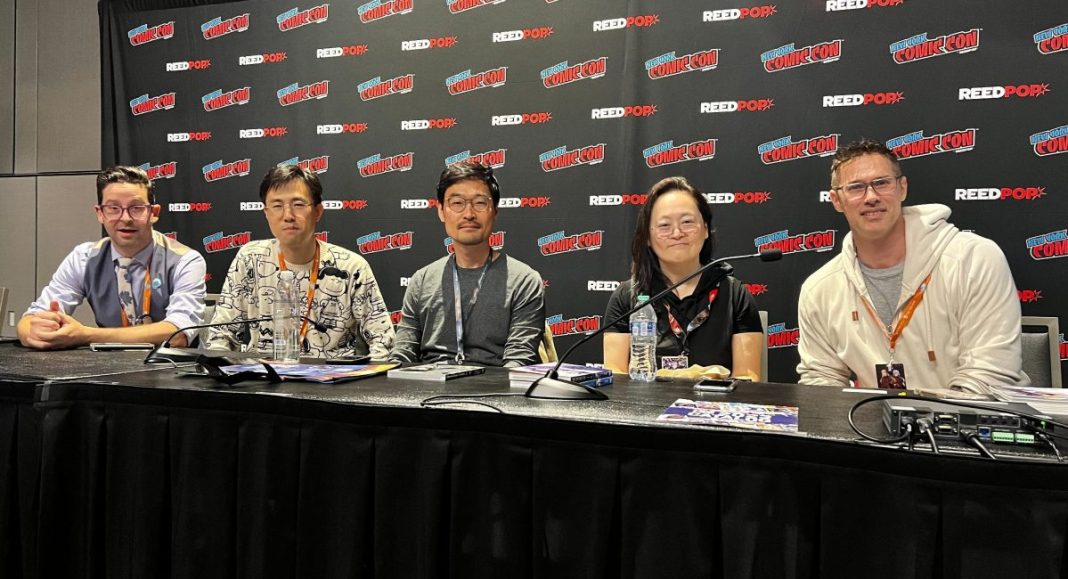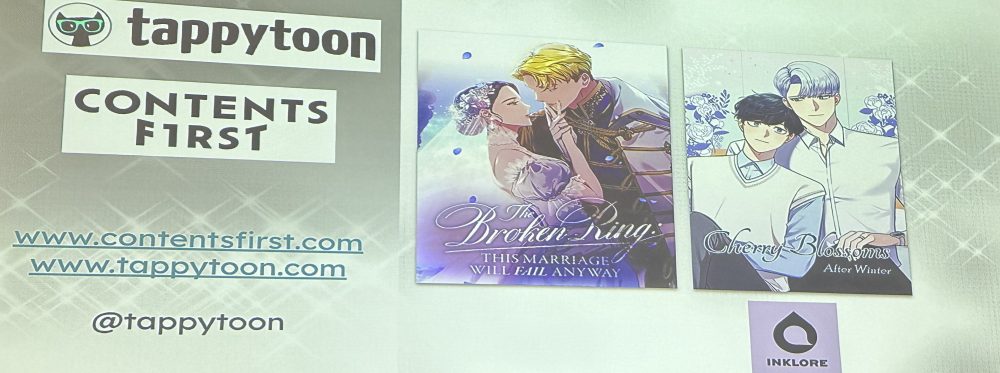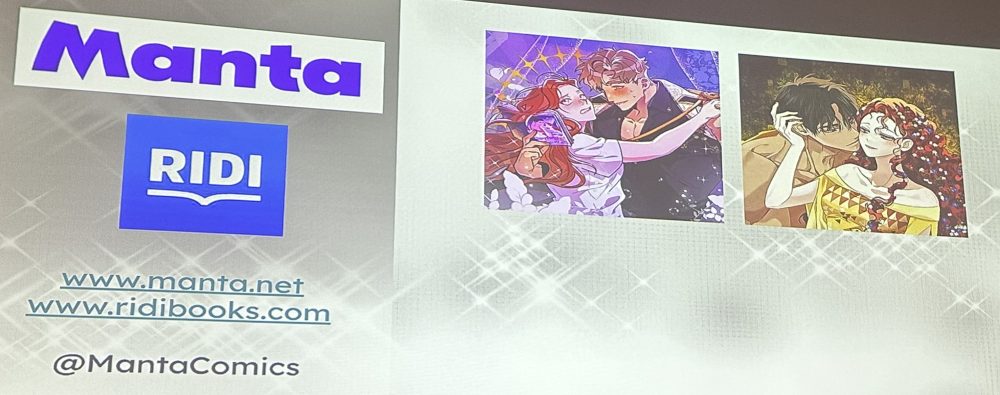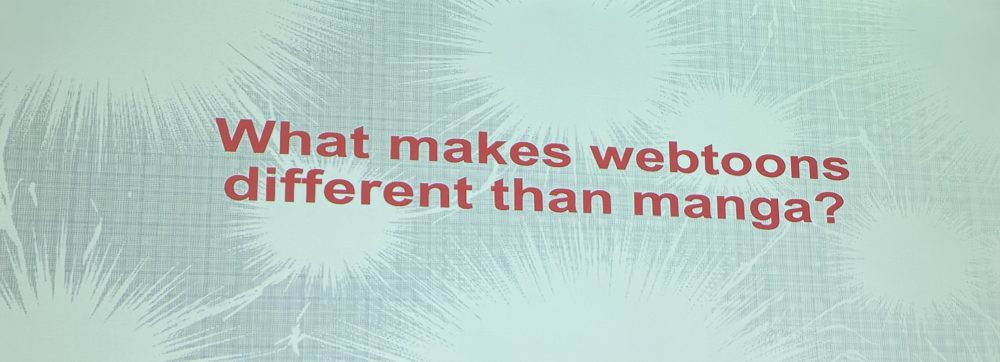With another New York Comic Con comes another Publishing Roundtable, moderated by our very own Deb Aoki, contributing writer for Publisher’s Weekly, co-host of the Mangasplaining podcast, and editor at Comics Beat. This time, the topic is webtoons! With the success of webtoon series like Solo Leveling, A Business Proposal, and Tower of God, Korean comics have been stamping their mark all over the North American comics publishing industry, whether they have drama or anime adaptations on the way. This discussion was held to inform readers of the current state of the Korean and vertical scroll comics that have been explosively successful.
The ‘Webtoon Publishing Panel’ Panelists
Wattpad WEBTOON Studios, President: Aron Levitz
Contents First/Tappytoon; Co-Founder/Chief Product Officer: Ernest Woo
Manta Comics, Head of Business Development: Sungho Lee
Yen Press/IZE Press, Deputy Publisher & Editor in Chief: JuYoun Lee
Rocketship Entertainment, CEO and Publisher: Tom Akel
Wattpad WEBTOON Studios is a joint venture between the Canadian-based online story platform Wattpad and Korea’s digital comics service WEBTOON, which is owned by Naver. They are now publishing print editions of their comics, such as True Beauty, Tower of God, and Cursed Princess Club, under their UNSCROLLED imprint.
The web-novel to webtoon pipeline isn’t as common outside Korea but Wattpad is working similarly in that vein.
Contents First is the company that owns the service Tappytoon. Two of their titles, The Broken Ring: This Marriage Will Fail Anyway and Cherry Blossoms After Winter will be published through Penguin Random House‘s INKLORE imprint. Their service also provides officially translated novel content.
Manta is newer on the scene. They are beginning to publish physical books like Under The Oak Tree with INKLORE. They have also branched out into web-novel content. Their subscription service is a flat-rate subscription model at $4.99 USD with an a la carte selection—think Netflix or Shonen Jump.
Yen Press is a manga publisher co-owned by Hachette Book Group in North America, and Kadokawa Corporation in Japan. Their imprint, IZE Press, is focused on Korean comics and novel content. They publish series in print that have been digitally distributed through other webtoon publishers like Tappytoon, WEBTOON, and Tapas. Those series include Solo Leveling, A Business Proposal, and The Boxer.
Rocketship primarily publishes webtoon content! They have comics for all ages, and have successfully kickstarted print editions of many popular comics, including the series Let’s Play, whose author, Leeanne M. Krecic, was also at NYCC to talk about the future of her works under the umbrella of Rocketship and Manta.
Comics have collectively raised over $30 million in 2022, and Rocketship says it is responsible for a sizeable chunk of that.
Comics Adapted from Novels
AOKI: Ernest, what does the web-novel business look like in Korea?
WOO: Tappytoon started a web-novel section because many of the webtoons they publish were originally novels. They’re also serialized in Korea, and because of the instant feedback of the digital model, authors can adjust the story as needed. Outside of Korea, the prevailing model seems to be mainly the content going straight to comic format.
SUNGHO: With Manta, there was a huge demand for web novels from our users, so we strove to meet that demand.
Bringing Webtoons to Print
JUYOUN: When The Beginning After The End was first published in print, two volumes were already published in Japan. However, IZE Press opted to work with Redeye Studio to revamp the formatting. For this release, they’re focusing on improving the action flow.
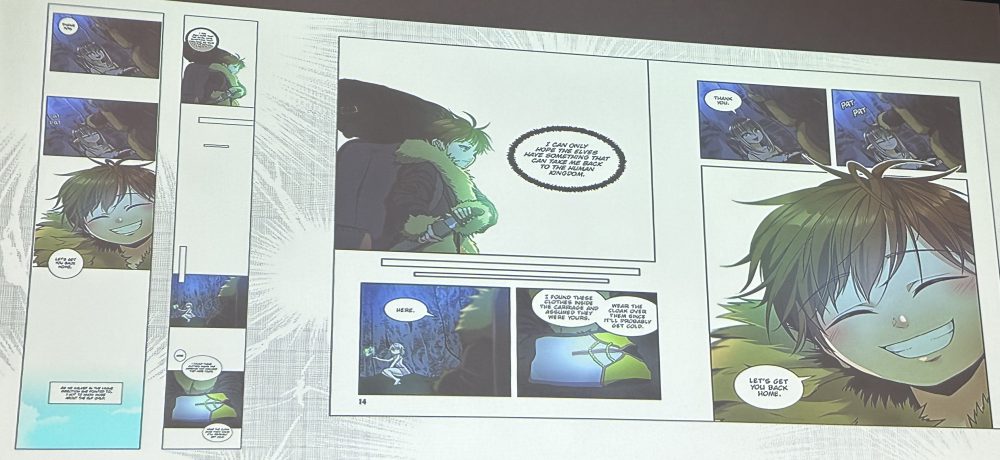
JUYOUN: IZE followed the Korean layout, but the French publisher’s release of Solo Leveling made their own because they felt it would better suit their market. This was a similar case.
What Makes Webtoons Different Than Manga?
AOKI: Webtoons seem more global than manga, whereas people seem to shun non-Japanese manga.
LEVITZ: Lore Olympus is a Webtoon. It’s a medium of storytelling where the vertical format allows different stories to be made. I see it as a medium transcending its roots rather than a genre. It’s just a way of telling stories!
WOO: What’s interesting about the vertical scroll format is that Koreans pride themselves on it; back from making it during the flip phone era, but it is global now. Even Japan is trying to dip its toes into it because it sees how it resonates with readers everywhere.
JUYOUN: I believe many authors in the beginning stages still made their content originally in book format. In the beginning, webtoons were not stories that had a flow; they were more like comic strips that were serialized without a long-term story, like Archie.
AOKI: The editor-in-chief of DC once complained about people wanting to read on phones, saying, “but those screens are tiny!” However, Korea has already addressed that. In a way, it feels like Western comics can be so behind in times.
LEVITZ: Webtoon page views are publicized, and it’s fascinating that these hits completely evade Bookscan. For WEBTOON, we also show the heart to see engagement—subscribers to the series—and we can make informed decisions with other metrics.
AKEL: For Rocketship, we use Kickstarter before launching the print books to give the fans extras for showing up for their favorites; so it also doesn’t show the full picture over Bookscan.
AOKI: It seems other publishers are courting you to offer in print!
SUNGHO: Some of our series have been popular without the help of print. We don’t have a comment section on Tappytoon, but we also look for engagement outside of our website. We look at AO3 (Archive of Our Own) or social media.
AKEL: A while ago, companies did not care about this stuff, like when I worked at WEBTOON. Many people said, “If I can read something online, I don’t want it in print,” but that attitude is now changing.
JUYOUN: When Yen first started, we had a Korean line. We didn’t know how webtoons would perform in book format, but we did know that the content was good and that the fans were there as well. The market is getting more competitive; we’re in the manga section of Barnes and Noble now, but maybe we’ll get our own K-comics section.
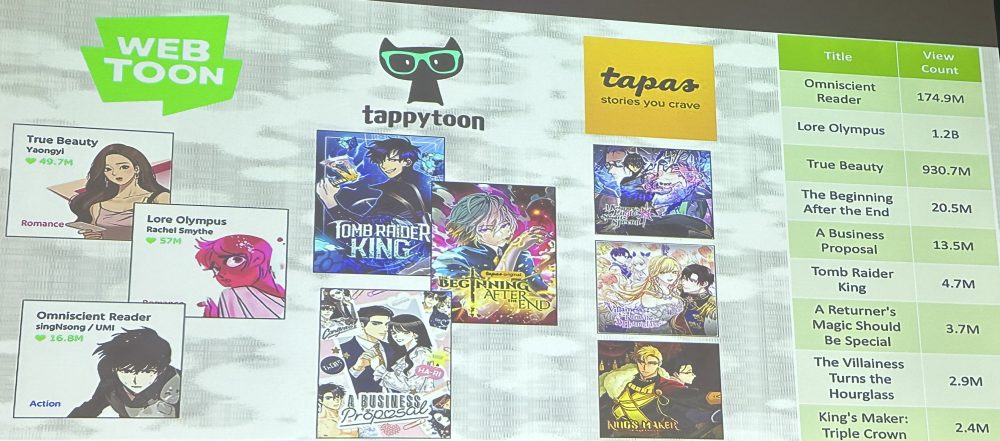
Challenges in Webtoon Publishing
AOKI: What is the biggest challenge/biggest opportunity you’re facing at Manta?
SUNGHO: When launching a new business, it’s hard to do on your own, so you must find good partners. This doesn’t mean you have to find only one partner. The key is finding someone who can also benefit from your partnership. The good news is that when I talked to several partners or competitors, they were all excited about the potential of this market. Things have progressed so that webtoons have become more recognizable in the market.
AKEL: As for Rocketship, comic stores and bookstores don’t quite understand it and must be educated on the market.
LEVITZ: One of the biggest challenges is accessibility. Manga can be intimidating if you’ve never seen it. The biggest opportunity is now that we’re publishing more print books and branching into other mediums.
WOO: I think we have a similar outlook. We consider story not as text-based or image-based, it’s just a story–and if it’s good, we want to get it to more people. We know best by working with the author on Webtoon format, but we’re also working on other formats like print, movies, and animation that have worked well for the manga and comics industry. Hopefully, this will circle back to webtoons.
JUYOUN: I want Yen and IZE to maintain this sort of dominant position it has carved out. There’s a limited amount of shelf space. At some point, the market will have to stabilize. This means we’ll have to find which stories will need to be presented in which way so that this will be a stable and enjoyable part of the publishing industry in the long run.
Mature Comics
AOKI: We’ve been dancing around it, but mature comics are also exploding. Can you talk about some of the challenges with the Android Play Store? Or publishing an explicit webnovel vs explicit webtoons?
WOO: Our app doesn’t have the mature version of our comics, but we do offer it on the website. We have to stay within those guidelines for app stores to continue offering it, but what we can do is work with our own website. It’s not difficult, but we still have to do it because this is how the creator envisioned their work. In terms of publishing or printing, I think it’s just up to those physical publishers. Some might be trying to do both.
AKEL: If the content is good, we’ll publish it. It depends on the model used by the distributor.
SUNGHO: If you put something graphic on an app, it’ll be removed, but we know authors have their own vision, and readers respect that. So we offer the same as Tappytoon: two versions, with the web version uncensored. It’s about finding the balance.


